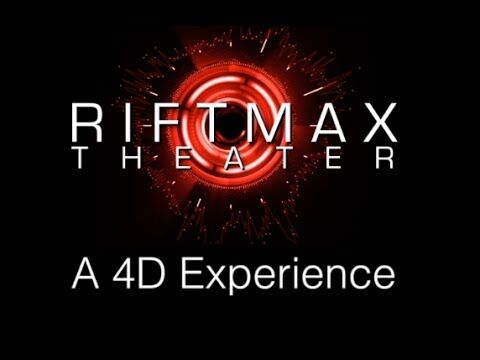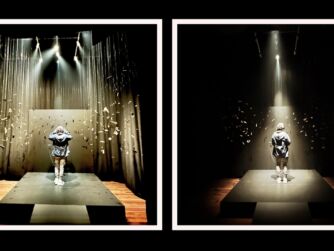Bilago is one of the developers of Riftmax Theater, which is a 4D, interactive social experience. What started as a way to watch YouTube videos in a theater environment has turned into what was voted to be the Best Social VR experience by the Proto Awards.

Riftmax hosts events like Gunter’s Virtually Incorrect talk show and has a regular karaoke night. The longest length of time that I’ve spent in virtual reality was 2 1/2 hours while being a guest on Virtually Incorrect. The fact that there were other real human beings there in that virtual space made it one of the most powerful VR experiences that I’ve had to date, and a testament to why Facebook acquired Oculus VR to do even more social experiences. I don’t think it’s an understatement when Mark Zuckerberg says that “Oculus has the chance to create the most social platform ever, and change the way we work, play and communicate.” Riftmax Theater is one of the applications that is on the leading edge of proving this out. My body has a memory of having a conversation with these avatars as if we were sitting on a theater stage because there was enough body language with the head tracking and Razer Hydra enabled hand movements.
The developers of Riftmax have started a modest Kickstarter $1 campaign in order to raise as much money as they can to continue development. Development will continue regardless, but they’ve set up a number of stretch goals to do even more features and functionality.
This video of testimonials from VR personalities is a great summary of what type of experiences that Riftmax has been able to provide to the VR community:
Rough Transcript
[00:00:05.452] Kent Bye: The Voices of VR Podcast.
[00:00:12.016] Bilago: My name is William. I'm known on Riffmax and on Reddit by the name Balago. Riffmax is a 4D interactive social experience majorly leading towards a theater experience, but we're actually trying to expand to more of a metaverse. We have some pretty interesting updates coming out with a new lobby system where it's more social than actual watching movies. It's gonna be pretty cool.
[00:00:34.747] Kent Bye: Yeah, I think the interesting thing about the Riffmax Theater is that you're kind of starting with this existing paradigm of going into a theater and sitting in seats and you know you're sort of just recreating that experience of going into a theater but it's sort of transformed into having talk shows and roundtables and so maybe talk about that evolution from where it started and where it's going and where it's ending up.
[00:00:57.078] Bilago: Yeah, I mean, when it started, it was just simple. Let's go into a really crude theater and load up a YouTube video. And now we're getting into a lot of the social aspects, and we want to eventually have teleconferencing and interviews and talk shows actually done just directly in VR, because that's where everything's heading as of right now.
[00:01:15.455] Kent Bye: And so yeah, maybe talk about some of the big nights and big shows that have been kind of a staple in the schedule of the VR community.
[00:01:23.183] Bilago: One of our biggest things we did, we actually hosted a premiere video viewing of a short film called Roadside. The director himself was going to present it at DragonCon, and he brought it to us first before he reviewed it there. We had two sessions viewing, one for UK and one for US. He actually paired 40 effects in the theater to match his video, which was really amazing. That was definitely one of our biggest things. That's where we want to go with the movie section of the game, is to actually have red carpet and premieres that people can't see outside of VR. Other than that, our other big thing that we do is our karaoke night on Thursday nights. 20 to 40 people come and start singing YouTube songs without the lyrics, and they just sing it on stage. I mean, it's really immersive and a lot of fun.
[00:02:07.807] Kent Bye: And there's also Gunter's talk shows that have also happened in Rhythm Hacks.
[00:02:11.648] Bilago: Yeah, every week he gets some of the top developers of the VR community and just talks about the current weekly VR news that's going on and kind of gets their input and where they see things are going.
[00:02:24.170] Kent Bye: And maybe talk a bit about what's happening on the back end in terms of what all do you need to actually create multiple people connecting and what are some of the issues that you see come up?
[00:02:34.276] Bilago: I mean, issue-wise, it's probably going to be like networking firewall issues with connected users. We're using Unity to create the actual multiplayer platform so they kind of have their own method that we just use to piggyback to get into the theater itself. We used to, as of last week, we kind of changed the way that we do our connections. We used to have a client that would host a server, and then from there the clients would actually connect to that person. We actually just moved now to a dedicated server running on its own virtual system on the cloud. So it's not run by anyone, it's just a unanimous server.
[00:03:07.893] Kent Bye: When you think about having talk shows of people with an audience, what are some of the design considerations moving forward in some future iterations in terms of creating the best optimal experience for people watching? I'm just trying to think if there's any way to think about breaking out of the constructs of a physical reality and having people hover and looking down or floating in space or a sphere where they're looking at it. rather than just sort of in a 2D plane, if you've kind of thought about or experimented with other ways of kind of setting people up like that.
[00:03:42.840] Bilago: Not yet. We're currently focusing more on core gameplay to kind of fix a lot of the issues people are seeing before we kind of expand into that kind of area of VR. We definitely would love to. I personally would like to see users sitting in their seats and then when something in space loads up, the entire theater disintegrates and they're floating in space watching the movie or watching the talk show. Stuff like that would definitely be awesome to have. We just haven't really spent any time developing this because we want to focus on the main core and get everyone up and running.
[00:04:12.166] Kent Bye: And during the karaoke night, I've seen videos and just sort of really crazy, wacky people riding whales and other really interesting things. Maybe talk about some of the experiments you've been doing in terms of playing with different stuff at karaoke night.
[00:04:29.055] Bilago: The whale is fun. We added that in for an underwater scene that was supposed to be for movies, but we load it once in a while for karaoke, and people love it. Not everyone likes to sing when they go to karaoke, so they like to have some other venue of entertainment as well, instead of just listening to people sing. So we load that up, let them ride the whale once in a while. Other than that, I mean, we mostly focus on the actual karaoke section. We try to keep it as real as possible in that regard. I used to be a karaoke DJ in real life at a bar, so they put me in charge of hosting it, so I try to keep it in that kind of scenario as you would if you actually walked into a karaoke bar when you were in real life.
[00:05:04.304] Kent Bye: And so what are some of the lessons of being a good karaoke DJ or host that you've carried from real life into virtual reality then?
[00:05:11.253] Bilago: The biggest thing would probably be tolerance of people. Drunk people are not fun to be around when you're not drunk, especially when you're hosting and they're drooling all over you trying to figure out when they're going to sing. Other than that, I mean, it's just having a good time and not being shy. I mean, if some nights you get in there and there's only two or three people out of 10 or 20 that want to sing, so you have to take it up and sing yourself half the night. So that's pretty much it.
[00:05:34.970] Kent Bye: And you said you're redoing the lobby. What's changing in the future lobby system of the Riff Max?
[00:05:40.172] Bilago: So right now, if you join the game, you're just going to load right into a theater of the user's choice, whichever theater that we have they want to load. We should be launching a new build that we've been working on for about two months now, probably either Monday or Tuesday, and it's going to be a live lobby system. So when you load into the game, you're actually going to load into a theater lobby instead of into a theater itself. And from there, you can either browse through the hallways and pick your theater. You can go into the arcade room. There's a piano bar you can hang out in. There's a nightclub. So it's a big social experience that you can do, not just watch movies, but actually hang out with your friends.
[00:06:17.631] Kent Bye: And what type of changes did you see in the social interactions once you added the positional tracking with the DK2?
[00:06:23.794] Bilago: A lot of personal bubbles were broken. Everyone likes to lean right into each other's faces. And if you haven't tried VR, people leaning on your faces actually makes you feel awkward. And people don't care, especially when they have the DK2 and the Hydras, their hands are in your face, their face is in your face. So they definitely don't have any kind of VR morals, I guess you could say. That's pretty much how it works. They don't care.
[00:06:51.447] Kent Bye: Interesting. So yeah, there's a certain amount of comfortable distance that people need in their personal space, and it sounds like people were just sort of going in virtual reality and really violating those boundaries that we normally have just to sort of see how cool it was, it sounds like.
[00:07:05.174] Bilago: Yeah, it's really weird. You think in a video game it wouldn't bother you, but it really does. There's been times where I just turn around, and there's someone like two inches from my face staring at me with like wide eyes, and it actually takes me back a second, and it's a really strange feeling.
[00:07:19.452] Kent Bye: And talk about the process of having a range of different avatars for people to choose. I think that's one important component of a VR social experience is having an identity that you're able to bring in.
[00:07:29.462] Bilago: Exactly. Right now we're kind of limited on our avatars, we haven't focused too much on that, but we definitely want to start going into the route of either having our own custom editor, so people can actually personalize each avatar to represent who they want to be, or have the system where they can use an avatar from somewhere else, and they can have their universal avatar they use within different apps, so they can transfer that into the game and their presence will always be the same avatar no matter which experience you see them in.
[00:07:54.859] Kent Bye: And because RiffMax has been focusing on a lot of social experiences, what are some of the biggest lessons learned that you think you've taken from working on this project?
[00:08:04.086] Bilago: We're definitely still in that realm of what works and doesn't work. RiffMax has been around for a year, and there's still a lot to learn in the VR space of social interaction. I can't really think of a specific lesson I've learned yet. I'm still learning as I go.
[00:08:20.854] Kent Bye: Has there been anything within the RiffMax that you guys have tried and you've decided, oh, that doesn't work at all, we need to take this out?
[00:08:28.434] Bilago: Surprisingly, we haven't taken any features out. Everything we've added in has stayed so far. We're taking user feedback as we go, and there really hasn't been too much complaint on the social end of the program. Just some technical issues, which is what we're focusing on now, mostly, is just getting everyone who has technical issues into the game properly, because there's a lot of them.
[00:08:46.060] Kent Bye: And finally, what do you see as the ultimate potential for what virtual reality could provide for social experiences?
[00:08:53.112] Bilago: It's going to be the outlet for people to have fun. I mean, most people at the end of the day probably would rather sit at home and hang out with their friends that live across the world. And that's what we want to provide is a method so you can see your family and your friends that you haven't seen in years and actually feel like you're there with them.
[00:09:07.771] Kent Bye: Great. Thank you. You're welcome.




